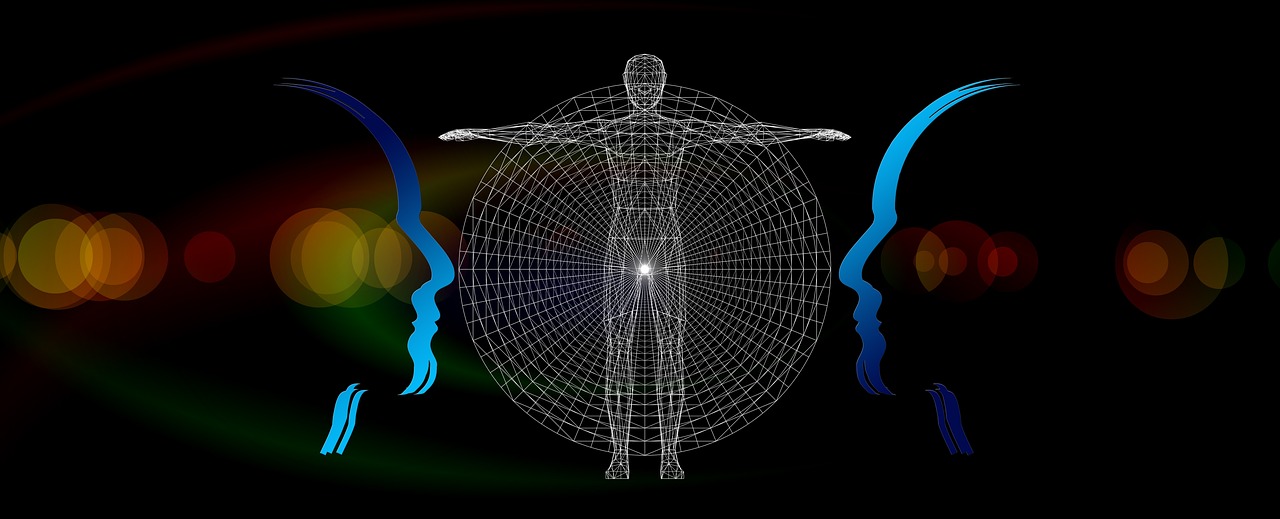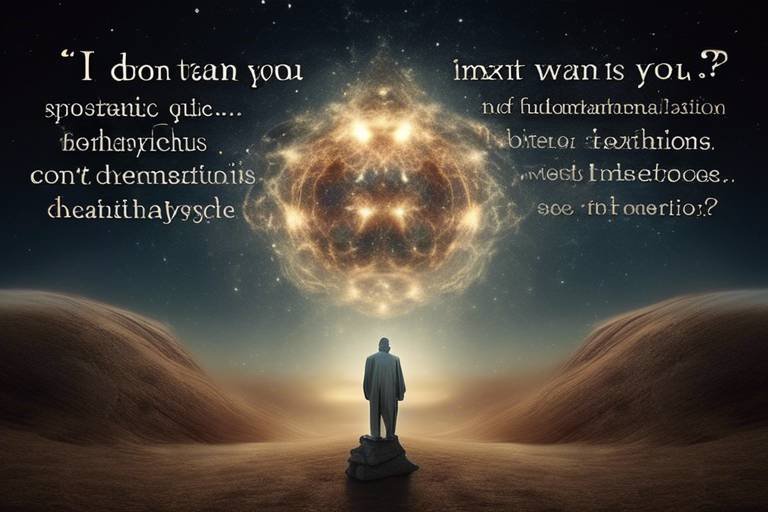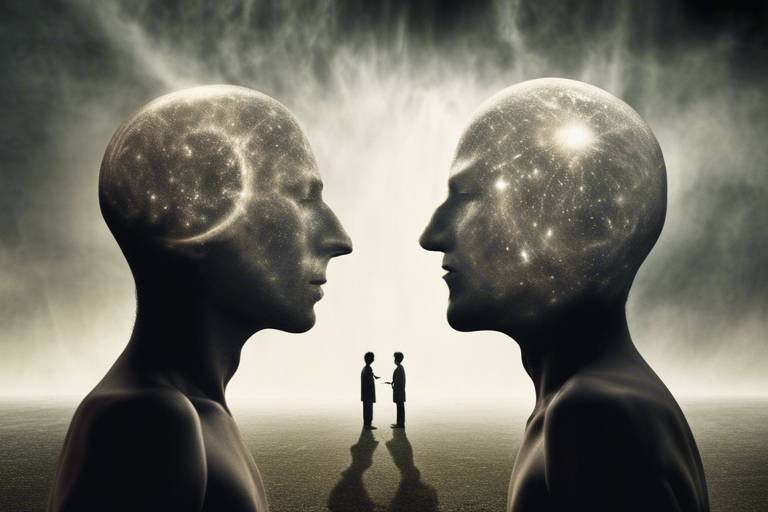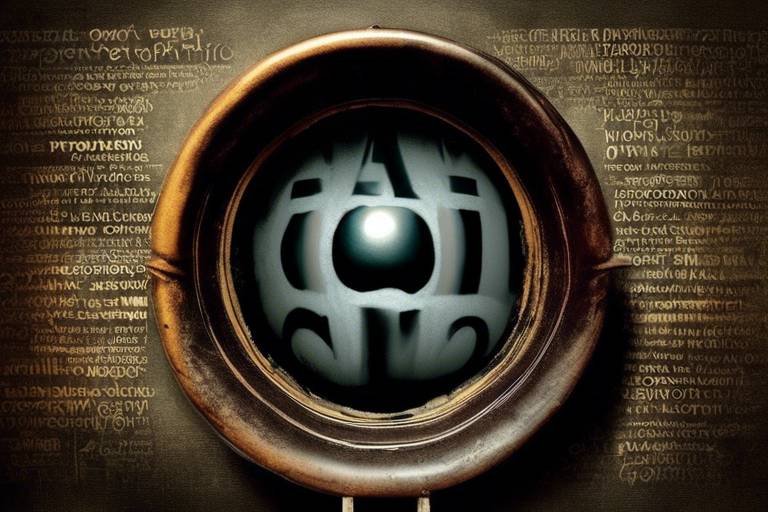Metaphysics - The Fundamental Questions
Welcome to the intriguing world of metaphysics, where we dive deep into the fundamental inquiries that have puzzled philosophers for centuries. Have you ever pondered the nature of existence or questioned what it truly means to be? If so, you're not alone! Metaphysics invites us to explore the very fabric of reality, challenging our perceptions and beliefs about the world around us.
At its core, metaphysics seeks to answer some of the most profound questions we can ask: What is existence? What is the nature of reality? Are we merely observers of a world that exists independently of our thoughts, or is our perception the very essence of what we experience? These questions are not just academic; they resonate with our everyday lives, influencing how we understand ourselves and our place in the universe.
Throughout this article, we will embark on a journey through various aspects of metaphysics, examining different philosophical perspectives that shape our understanding of existence and reality. From the debates between realism and idealism to the complexities of causality and determinism, each section will unravel the intricacies of these concepts, providing insights that are both enlightening and thought-provoking.
As we navigate through these topics, we'll also encounter the challenges posed by skepticism and the arguments that defend the notion of an objective reality. Additionally, we'll delve into the nature of time and identity, exploring how these elements interact with our understanding of existence. By the end of this exploration, we hope to illuminate the profound questions that metaphysics poses, encouraging you to reflect on your own beliefs and perceptions.
So, are you ready to embark on this philosophical adventure? Let's dive in and explore the fundamental questions of metaphysics together!
- What is metaphysics? Metaphysics is a branch of philosophy that studies the fundamental nature of reality, existence, and the relationships between objects and their properties.
- Why is metaphysics important? Understanding metaphysics helps us grasp the underlying principles that govern our reality and influences our worldview.
- What are some key concepts in metaphysics? Key concepts include existence, reality, identity, causality, and the nature of time.
- How does metaphysics relate to other fields of philosophy? Metaphysics interacts with epistemology (the study of knowledge), ethics, and logic, providing a foundation for understanding various philosophical inquiries.

The Nature of Existence
When we dive into the philosophical waters of existence, we're essentially asking the big questions: What does it mean to exist? What criteria do we use to define existence? Is existence merely about being physically present, or does it encompass something deeper? These questions have puzzled thinkers for centuries. Some argue that existence is tied to our perception of reality, while others believe that something can exist independently of our awareness.
One of the most fascinating aspects of existence is the distinction between ontological existence and phenomenal existence. Ontological existence refers to the fundamental nature of being, while phenomenal existence relates to how we experience and interpret that being. To put it simply, think of ontological existence as the raw ingredients of a cake, while phenomenal existence is the cake itself, shaped and flavored by our experiences.
Different philosophical perspectives can shed light on these inquiries. For example, the ancient Greek philosopher Parmenides argued that change is an illusion and that existence is a singular, unchanging reality. In contrast, his student Heraclitus believed that change is the essence of existence, famously stating, "You cannot step into the same river twice." This debate highlights the complexity of defining existence and the myriad ways we can approach it.
In modern discussions, existentialists like Jean-Paul Sartre emphasize the importance of individual experience and choice in defining existence. According to Sartre, existence precedes essence, meaning that we create our own meaning and purpose through our actions. This perspective invites us to consider not just what exists, but how we engage with that existence. Are we passive observers, or active participants in our reality?
To further understand the nature of existence, we can categorize it into several key themes:
- Material Existence: This refers to the physical world and the entities within it, governed by the laws of nature.
- Abstract Existence: Concepts, ideas, and emotions that exist in our minds, influencing our perceptions and interactions.
- Existential Existence: The subjective experience of being, encompassing our thoughts, feelings, and consciousness.
Each of these themes invites us to reflect on our understanding of existence. Are we merely biological organisms, or is there a deeper essence that defines us? The quest for understanding existence is not just an intellectual exercise; it shapes our lives, beliefs, and choices. As we grapple with these questions, we develop a richer appreciation for the complexity of reality and our place within it.
Ultimately, the nature of existence is a tapestry woven from various threads of thought, perception, and experience. Each philosophical perspective offers a unique lens through which to view this profound question, reminding us that the journey toward understanding may be as important as the answers we seek.
- What is the difference between existence and reality?
Existence refers to the state of being, while reality encompasses everything that exists, including the perceptions and interpretations of that existence.
- Can something exist without being perceived?
This is a subject of debate in philosophy; some argue that existence is independent of perception, while others believe that perception is crucial to defining existence.
- What role does consciousness play in existence?
Consciousness is often seen as a key aspect of existence, shaping how we experience and understand the world around us.

Reality vs. Perception
When we think about the world around us, we often find ourselves caught in a web of perceptions that shape our understanding of reality. But what does it really mean to perceive something, and how does that differ from the actual state of existence? It's a question that has puzzled philosophers for centuries, and one that continues to ignite fervent debates today. To grasp the essence of this distinction, we must first acknowledge that our senses—sight, sound, touch, taste, and smell—are the windows through which we experience the world. However, these windows can be fogged by our experiences, emotions, and biases, leading us to interpret reality in ways that might not align with its true nature.
For instance, consider a simple scenario: two people watching the same sunset. One person might see a breathtaking array of colors and feel a profound sense of peace, while the other might focus on the impending darkness and feel a sense of dread. Both are experiencing the same event, yet their perceptions are entirely different. This highlights a fundamental truth: our perceptions are not merely reflections of reality; they are interpretations shaped by our individual experiences and mental frameworks.
Moreover, the philosophical distinction between objective reality and subjective perception becomes crucial here. Objective reality refers to the state of things as they truly are, independent of human thoughts or feelings. In contrast, subjective perception is how an individual interprets and understands those things based on their unique context. This dichotomy raises important questions: Can we ever truly know objective reality? Or are we forever bound to our subjective interpretations?
To delve deeper into this concept, let’s outline some key points that illustrate the relationship between reality and perception:
- Subjectivity: Our personal experiences heavily influence how we perceive reality. What one person sees as a problem, another may view as an opportunity.
- Bias: Cognitive biases can distort our perceptions, leading us to favor information that aligns with our preexisting beliefs.
- Interpretation: The same event can be interpreted in vastly different ways, depending on one's emotional state, background, and culture.
These factors contribute to a complex interplay between reality and perception. Philosophers like Immanuel Kant argued that our understanding of the world is shaped by the mental structures we possess, suggesting that we can never access reality in its purest form. Instead, we are always viewing it through a lens of perception that is tinted by our experiences, emotions, and cognitive frameworks.
As we navigate through life, this interplay can lead to misunderstandings and conflicts. For example, in interpersonal relationships, one person’s perception of an event can clash with another’s, leading to arguments or emotional distress. This is why it’s crucial to cultivate empathy and strive for open communication. By acknowledging that our perceptions may not encompass the full reality, we can foster a deeper understanding of others' perspectives.
In summary, the relationship between reality and perception is intricate and multifaceted. While we may aspire to grasp the objective truths of our existence, we must recognize that our perceptions are inherently subjective. This realization can empower us to approach our interactions with greater awareness and compassion, ultimately enriching our understanding of the world and the people in it.
- What is the difference between reality and perception?
Reality refers to the state of things as they exist independently, while perception is how individuals interpret and understand those things based on their experiences. - Can we ever truly know objective reality?
Philosophers debate this question, with many suggesting that our understanding is always filtered through subjective lenses, making it challenging to access pure objective reality. - How do biases affect our perceptions?
Cognitive biases can distort our understanding, leading us to favor information that aligns with our existing beliefs and potentially skewing our interpretation of reality.

Philosophical Realism
Philosophical realism is a compelling viewpoint in the realm of metaphysics, asserting that reality exists independently of our thoughts, beliefs, or perceptions. Imagine standing in front of a massive mountain; whether you acknowledge its presence or not, that mountain exists in the world. This straightforward analogy encapsulates the essence of realism: the belief that the universe is populated with entities and phenomena that do not rely on human consciousness to be real. Realists argue that our understanding of the world is shaped by an objective reality that we can discover through observation and scientific inquiry.
In its essence, realism invites us to consider a few critical questions: What is the nature of reality? How can we ascertain what is truly real? And, importantly, how do our perceptions influence our understanding of that reality? To explore these questions, it is essential to recognize that philosophical realism comes in various forms, each offering a unique perspective on the relationship between our minds and the external world. For instance, metaphysical realism posits that objects exist independently of our perception, while epistemological realism emphasizes our capacity to gain knowledge about those objects.
One of the key strengths of philosophical realism lies in its commitment to the idea that the universe operates according to specific laws and principles that can be understood through reason and empirical evidence. This perspective has propelled scientific advancements, as it encourages inquiry and exploration based on the assumption that there is a reality to uncover. However, realism is not without its challenges. Critics often argue that our perceptions are inherently subjective, leading to a distorted understanding of reality. This tension between objective reality and subjective experience forms the crux of many philosophical debates.
To illustrate this, consider the following table that outlines the main types of philosophical realism:
| Type of Realism | Description |
|---|---|
| Metaphysical Realism | Belief that objects exist independently of our perception. |
| Epistemological Realism | Focuses on the ability to gain knowledge about the external world. |
| Scientific Realism | Claims that the world described by science is real and not just a construct of our minds. |
Despite these challenges, philosophical realism remains a vital framework for understanding metaphysical inquiries. It serves as a foundation for discussions about existence, knowledge, and the nature of reality itself. By embracing realism, we engage with the world as it is, rather than as we wish it to be, fostering a deeper appreciation for the complexities of existence. So, the next time you ponder the nature of reality, remember that philosophical realism invites you to explore the world with an open mind, grounded in the belief that there is more to discover beyond our perceptions.
- What is philosophical realism? Philosophical realism is the view that reality exists independently of our thoughts and perceptions.
- What are the types of realism? The main types include metaphysical, epistemological, and scientific realism.
- How does realism impact scientific inquiry? Realism encourages the exploration of reality through observation and empirical evidence, which is fundamental to scientific progress.
- What are the criticisms of philosophical realism? Critics argue that our perceptions are subjective, which may lead to a distorted understanding of objective reality.

Challenges to Realism
When we dive deep into the waters of philosophical realism, we quickly realize that it’s not all smooth sailing. In fact, the challenges to realism are like waves crashing against the sturdy ship of objective reality. One of the most significant challenges comes from scepticism, a philosophical stance that questions our ability to truly know anything about the world beyond our perceptions. Skeptics argue that our senses can deceive us, leading us to believe in a reality that may not exist as we perceive it. For example, consider a mirage in the desert; it tricks our eyes into seeing water when, in fact, there is none. This raises a crucial question: if our senses can mislead us, how can we trust our understanding of reality?
Another formidable opponent to realism is idealism, which posits that reality is fundamentally mental or immaterial. Idealists argue that what we perceive as the physical world is merely a construct of our minds. This perspective challenges the very foundation of realism, suggesting that our thoughts and perceptions are the primary components of existence. Imagine a dream where everything feels real, yet it vanishes the moment you wake up. This analogy highlights the idealist contention that reality may be a fleeting illusion shaped by our consciousness.
Moreover, the philosophical debate surrounding realism is further complicated by the concept of relativism. Relativists claim that truth and reality are not absolute but vary based on different perspectives and cultural contexts. For instance, what is considered 'real' in one culture may be viewed entirely differently in another. This raises an intriguing thought: if reality is subjective, then how can we ever arrive at a universal understanding of existence?
To summarize, the challenges to realism can be categorized into three main areas:
- Scepticism: Questions our ability to know anything beyond our perceptions.
- Idealism: Suggests that reality is a mental construct.
- Relativism: Proposes that truth varies across different perspectives.
These challenges force us to reconsider our assumptions about reality and existence. They compel us to engage in a deeper inquiry about what it means to truly understand the world around us. As we navigate through these philosophical waters, we must remain open to the possibility that our grasp on reality may be more tenuous than we initially believed. In essence, the challenges to realism not only enrich our understanding of metaphysics but also invite us to explore the very nature of knowledge itself.
- What is realism in philosophy? Realism is the belief that reality exists independently of our thoughts and perceptions.
- What are the main challenges to realism? The main challenges include scepticism, idealism, and relativism.
- How does scepticism challenge our understanding of reality? Scepticism questions our ability to know anything beyond our senses, suggesting they can be deceptive.
- What is the difference between realism and idealism? Realism asserts that reality is objective and exists independently, while idealism claims that reality is mentally constructed.

Defending Realism
Defending realism in metaphysics is akin to standing on a sturdy rock while the waves of skepticism crash around you. Realism asserts that reality exists independently of our thoughts and perceptions, which can feel like a bold claim in a world where subjective experiences often dominate our understanding. But why should we hold onto this view? Let’s explore some compelling arguments that bolster the case for realism.
First and foremost, realism aligns with our everyday experiences. When we interact with the world, we operate under the assumption that objects and events exist outside our minds. For example, when you toss a ball, you don't question whether the ball will bounce back or if it exists only in your imagination. This intuitive belief in an external reality forms the backbone of scientific inquiry and our ability to predict outcomes based on observation.
Moreover, realism provides a robust framework for scientific progress. The scientific method relies on the premise that there is an objective reality that can be studied, measured, and understood. If we were to adopt a purely idealistic view, where reality is merely a construct of our minds, the very foundation of empirical research would crumble. Scientists make predictions based on the assumption that their observations reflect an underlying reality, which can be tested and verified. Without this assumption, the reliability of scientific findings would be severely undermined.
Additionally, realism offers a coherent explanation for the consistency of natural laws. Consider the law of gravity: it operates consistently regardless of individual belief or perception. If reality were subjective, we would expect to see vastly different experiences of gravity based on individual perspectives. Yet, the fact that we all experience gravity in the same way suggests that there is an objective reality governing these phenomena.
Furthermore, realism accommodates the existence of abstract entities, such as numbers and concepts, which cannot be physically observed yet are crucial for our understanding of the world. For instance, the number "2" exists as a concept that helps us quantify and understand reality, even though it is not a tangible object. This aspect of realism allows for a richer exploration of metaphysical questions, bridging the gap between the physical and the abstract.
In defending realism, we also encounter challenges that can be addressed through careful reasoning. Critics may argue that our perceptions are flawed or that we can only know reality through our subjective lens. However, realism acknowledges the limitations of human perception while maintaining that an objective reality exists regardless of our ability to fully comprehend it. This perspective encourages continuous exploration and refinement of our understanding rather than succumbing to nihilism or skepticism.
Ultimately, defending realism is not merely an academic exercise; it has profound implications for how we navigate our lives and understand our place in the universe. By embracing the idea that an objective reality exists, we empower ourselves to seek knowledge, challenge assumptions, and engage with the world in meaningful ways. So, the next time you ponder the nature of existence, remember that standing firm in the belief of realism can illuminate the path to deeper understanding and connection with the world around us.
- What is realism in metaphysics? Realism posits that reality exists independently of our perceptions and thoughts.
- How does realism relate to science? Realism underpins scientific inquiry by asserting that there is an objective reality that can be studied and understood.
- What are the challenges to realism? Challenges include skepticism and idealism, which question our ability to know reality.
- Can realism explain abstract concepts? Yes, realism accommodates abstract entities, allowing for a comprehensive exploration of metaphysical questions.

Idealism and Its Implications
When we dive into the philosophical concept of idealism, we find ourselves in a world where reality is not merely a collection of physical objects but rather a tapestry woven from our thoughts, perceptions, and consciousness. Imagine for a moment that everything you see, feel, and experience is a reflection of your mind's eye—this is the essence of idealism. This perspective posits that the material world is either dependent on or entirely constructed by our mental states. So, what does this mean for our understanding of existence and reality? Let's unravel this intriguing notion.
Idealism can be traced back to the works of philosophers like George Berkeley, who famously stated, "To be is to be perceived." In this view, objects do not exist independently of our perception of them. If you think about it, this challenges our everyday assumptions. For instance, if a tree falls in a forest and no one is around to hear it, does it make a sound? Idealism would argue that without a perceiver, the tree's existence is questionable. This leads us to consider the implications of idealism on our understanding of reality:
- Reality as a Mental Construct: If reality is shaped by our perceptions, then each individual's experience is unique, leading to a pluralistic view of existence.
- Subjectivity of Knowledge: Knowledge becomes inherently subjective, raising questions about the validity of shared experiences and scientific truths.
- Impact on Ethics and Morality: If reality is shaped by our thoughts, then moral truths may also be seen as constructs rather than absolutes.
However, idealism isn't without its challenges. Critics argue that it leads to a form of solipsism, where only one's mind is sure to exist, potentially isolating individuals from a shared reality. This raises the question: if our perceptions create reality, how do we account for the experiences of others? The debate between idealism and realism becomes a battleground for understanding the fundamental nature of existence.
Despite these challenges, idealism opens the door to profound implications for metaphysics. It invites us to explore the nature of consciousness and its role in shaping our world. For instance, if we accept that our minds play a crucial role in constructing reality, we might also consider how collective consciousness influences societal norms and values. This perspective can lead to a more compassionate understanding of human experiences, as it emphasizes the interconnectedness of our perceptions.
In conclusion, idealism serves as a powerful lens through which we can examine the nature of reality and existence. It challenges us to reconsider the relationship between our minds and the world around us, urging us to explore the deeper implications of our perceptions. As we navigate this philosophical landscape, we must remain open to the complexities that arise, recognizing that the interplay between thought and reality is as intricate as the finest tapestry.
1. What is idealism in philosophy?
Idealism is a philosophical theory that asserts that reality is fundamentally mental and immaterial, suggesting that objects do not exist independently of our perceptions of them.
2. Who are some key figures associated with idealism?
Notable philosophers associated with idealism include George Berkeley, Immanuel Kant, and G.W.F. Hegel, each contributing unique perspectives to the concept.
3. How does idealism differ from realism?
While idealism posits that reality is shaped by our perceptions, realism argues that reality exists independently of our thoughts and perceptions.
4. What are some implications of idealism?
Idealism has implications for ethics, knowledge, and our understanding of consciousness, suggesting that our perceptions play a crucial role in shaping our reality and moral truths.

Causality and Determinism
The concepts of causality and determinism are fundamental to our understanding of the universe and our place within it. At its core, causality refers to the relationship between causes and their effects. It's the principle that every event or action is the result of a preceding cause. Think of it like a chain reaction: one event triggers another, leading to a series of outcomes that shape our reality. This chain can be as simple as a domino falling or as complex as the intricate web of events that led to a historical moment.
On the other hand, determinism posits that every event in the universe is determined by preceding events in accordance with the natural laws. Imagine a vast, intricate machine where every gear and lever is precisely placed; when one part moves, it inevitably causes another part to move in a specific way. This perspective raises profound questions about free will. If every action we take is predetermined by a series of prior events, do we truly have the ability to choose? Or are we merely following a path laid out by the universe?
To explore these concepts further, let’s break down the implications of causality and determinism:
- Understanding Free Will: If determinism holds true, our sense of agency may be an illusion. But does this mean we should abandon moral responsibility?
- Nature of Events: The relationship between cause and effect shapes our understanding of events in both the physical and metaphysical realms.
- Scientific Implications: In fields like physics, causality is essential in formulating theories and understanding the universe's workings.
Philosophers have long debated these ideas, with various schools of thought emerging over time. For instance, compatibilists argue that free will and determinism are not mutually exclusive. They suggest that even if our actions are determined, we can still act freely as long as we are not coerced. In contrast, incompatibilists maintain that if determinism is true, free will cannot exist. This ongoing debate highlights the complexity of our understanding of human agency and the nature of reality.
Moreover, the implications of causality extend beyond mere philosophical musings; they affect how we interpret our experiences and navigate our lives. When we consider events in our past, we often attribute meaning to them based on their outcomes. This retrospective understanding can shape our decisions moving forward, reinforcing the idea that while we may not control every event, we can influence our responses to them.
In conclusion, the interplay of causality and determinism invites us to reflect on our existence. Are we simply players in a grand play scripted by the universe, or do we have the power to write our own lines? The answers may not be clear-cut, but the exploration of these questions is essential for grasping the depths of metaphysical inquiry.
- What is causality? Causality is the relationship between causes and their effects, indicating that every event is the result of a preceding cause.
- What is determinism? Determinism is the philosophical view that all events are determined by preceding events in accordance with the natural laws.
- Can free will exist in a deterministic universe? This is a debated topic; some argue for compatibilism, suggesting that free will can coexist with determinism, while others insist they are incompatible.

The Problem of Free Will
The concept of free will has long been a hot topic in philosophical discussions, igniting debates that often feel like a never-ending game of tug-of-war. On one side, we have those who passionately argue that we are the architects of our own destinies, capable of making choices independent of external influences. On the other side, skeptics raise their eyebrows and point to the deterministic nature of the universe, suggesting that our choices are merely illusions shaped by a myriad of factors beyond our control. This dichotomy raises an essential question: Are we truly free, or are we simply following a preordained path?
To better understand the problem of free will, let's break it down into several key perspectives:
- Determinism: This viewpoint posits that every event, including human actions, is determined by preceding events in accordance with the natural laws. Think of it as a giant domino effect where one event leads to another, leaving no room for genuine choice.
- Libertarianism: In contrast, libertarians argue that we do possess free will. They believe that individuals can make choices that are not entirely dictated by prior events or external conditions, much like a bird soaring freely through the sky.
- Compatibilism: This middle ground suggests that free will and determinism can coexist. Compatibilists argue that even if our choices are influenced by prior events, we can still act freely as long as we are not coerced. It’s like choosing your favorite ice cream flavor while being presented with a limited selection; you still have the freedom to choose within those constraints.
One of the most compelling aspects of the free will debate is its implications for moral responsibility. If our actions are predetermined, can we truly be held accountable for our choices? Imagine a world where every action is scripted, akin to a play where actors have no say in their lines. Would it be fair to punish someone for a crime they had no real choice in committing? This question sends ripples through our legal systems and ethical frameworks, challenging the very foundation of how we view justice and accountability.
Moreover, the problem of free will invites us to consider the psychological aspects of decision-making. Cognitive science suggests that many of our decisions are influenced by unconscious processes, which raises the question: how much control do we actually have over our choices? It’s like an iceberg; the visible part represents our conscious decisions, while the massive submerged part signifies the unseen influences that guide our thoughts and actions.
In conclusion, the problem of free will is a multifaceted issue that intertwines philosophy, psychology, and ethics. As we navigate through life, grappling with the question of whether we are truly free or merely puppets on a string, we find ourselves at the crossroads of existential inquiry. The exploration of this topic not only enriches our understanding of human behavior but also challenges us to reflect on our beliefs about autonomy and responsibility.
- What is free will? Free will is the ability to make choices that are not determined by prior causes or divine intervention.
- Are free will and determinism compatible? Compatibilists argue that free will and determinism can coexist, suggesting that individuals can still make free choices within a deterministic framework.
- How does free will impact moral responsibility? If our choices are predetermined, it raises questions about accountability and whether we can justly be held responsible for our actions.

Implications of Causality
Causality is like the secret thread that stitches together the fabric of our universe. It’s not just about one event causing another; it’s about understanding the intricate web of connections that define our reality. When we think about causality, we often find ourselves pondering the question: What does it mean for something to cause something else? This question opens up a multitude of implications that stretch far beyond simple cause-and-effect scenarios. For instance, consider how causality influences our understanding of time. If every effect has a cause, it implies a linear progression where the past influences the present and, subsequently, the future. This leads us to the fascinating realm of determinism.
Determinism posits that every event or state of affairs, including every human action, is the outcome of preceding events in accordance with the natural laws. This idea can be both empowering and disheartening. On one hand, it suggests a universe governed by order and predictability; on the other hand, it raises challenging questions about free will. If our choices are merely the result of prior causes, can we truly claim to have agency over our lives? This tension between causality and free will is a major philosophical battleground, with thinkers like David Hume and Immanuel Kant offering differing perspectives on the matter.
Furthermore, the implications of causality extend into the realm of ethics and morality. If our actions are determined by prior states, can we hold individuals accountable for their choices? This question invites us to examine the very foundations of our justice systems and societal norms. It challenges us to think critically about concepts such as punishment, reward, and moral responsibility. In essence, causality doesn’t just shape our understanding of the universe; it shapes our understanding of ourselves and our interactions within it.
To illustrate the complexities of causality, consider the following table that outlines key philosophical perspectives:
| Philosopher | View on Causality |
|---|---|
| David Hume | Argued that causality is not a direct observation but a habit of thought based on experience. |
| Immanuel Kant | Suggested that causality is a necessary condition for human experience; we impose it on the world. |
| Aristotle | Defined four types of causes: material, formal, efficient, and final, emphasizing a more comprehensive view. |
As we delve deeper into the implications of causality, we can’t ignore the role of scientific inquiry. The laws of physics, for example, are built on a foundation of causal relationships. Understanding how one event leads to another allows scientists to predict outcomes and develop theories that explain the workings of the universe. This intertwining of philosophy and science highlights the importance of causality in shaping not just our understanding of the world, but also our technological advancements and innovations.
In conclusion, the implications of causality are vast and multifaceted. They challenge our perceptions of time, free will, morality, and even our understanding of the universe itself. By grappling with these implications, we can gain a richer understanding of our place in the cosmos and the intricate dance of cause and effect that defines our existence.
- What is causality? Causality refers to the relationship between causes and effects, where one event (the cause) leads to the occurrence of another event (the effect).
- How does causality relate to free will? The relationship between causality and free will is complex; if our actions are determined by prior causes, it raises questions about our ability to make independent choices.
- Can we truly understand causality? While we can observe causal relationships, the philosophical implications of causality invite ongoing debate and exploration.

The Nature of Time
Time is one of those elusive concepts that we often take for granted, yet it profoundly shapes our understanding of existence. Have you ever stopped to wonder what time really is? Is it merely a sequence of events, or is it something deeper? Philosophers have pondered these questions for centuries, leading to a rich tapestry of theories that attempt to unravel the mystery of time. In this section, we will explore various philosophical theories of time, including presentism and eternalism, and delve into their implications for our metaphysical understanding.
At its core, the debate about time revolves around two main perspectives: presentism and eternalism. Presentism posits that only the present moment is real, while the past and future are merely constructs of our imagination. This view aligns with our everyday experiences; after all, we can only live in the present. On the other hand, eternalism argues that all points in time—past, present, and future—exist simultaneously. This perspective can feel counterintuitive, as it challenges our linear perception of time. To illustrate these concepts further, consider the following table:
| Theory | Definition | Implications |
|---|---|---|
| Presentism | Only the present moment is real. | Past and future events do not exist. |
| Eternalism | All points in time exist simultaneously. | Time is like a landscape, where every moment is equally real. |
These differing views lead to fascinating implications regarding our understanding of existence. If we adopt a presentist view, we might conclude that our actions have a unique significance in the here and now, emphasizing the importance of living in the moment. Conversely, eternalism invites us to consider the interconnectedness of all experiences, suggesting that every moment contributes to the grand tapestry of existence.
Another intriguing aspect of time is the concept of its flow. Do we experience time as a linear progression, or is it cyclical? Some cultures perceive time as a circle, where events recur in a repeating cycle, while others see it as a straight line, moving from past to present to future. This raises an essential question: is the flow of time an illusion? Philosophers and scientists continue to debate this, but one thing is clear—our perception of time significantly influences how we navigate our lives.
In summary, the nature of time is a complex and multifaceted topic that invites us to reflect on our understanding of existence. Whether we lean towards presentism or eternalism, the implications of our beliefs about time shape not only our philosophical inquiries but also our everyday experiences. As we explore these ideas, we can't help but wonder: how does our perception of time influence our identity, choices, and ultimately, our reality?
- What is presentism? Presentism is the philosophical view that only the present moment is real, while the past and future do not exist.
- What is eternalism? Eternalism posits that all points in time—past, present, and future—exist simultaneously.
- Is time linear or cyclical? Different cultures and philosophies view time in varying ways; some see it as linear, while others perceive it as cyclical.
- Does the flow of time exist? The flow of time is debated among philosophers and scientists; some argue it is an illusion, while others maintain it is a fundamental aspect of our experience.

Presentism vs. Eternalism
When diving into the philosophical waters of time, two major theories often come to the forefront: Presentism and Eternalism. Each presents a unique lens through which we can view the nature of existence and the flow of time. So, what exactly do these theories entail, and how do they shape our understanding of reality?
Presentism posits that only the present moment is real. According to this view, the past is gone, and the future is yet to come; they are mere constructs of our minds. Imagine a photograph of a beautiful sunset. The moment captured is real, but the moments before and after are not part of that photograph—they exist only in our memories or imaginations. This perspective emphasizes the significance of the here and now, suggesting that our experiences are grounded solely in the present.
On the flip side, we have Eternalism, which argues that all points in time—past, present, and future—are equally real. Think of time as a vast landscape, where every moment is a location you can visit. In this view, just because we are currently experiencing the present does not mean that the past has vanished or that the future is non-existent. Instead, every moment is like a frame in a movie reel, existing simultaneously, regardless of our perception of time. This perspective opens up intriguing discussions about fate, destiny, and the nature of reality itself.
To better understand the distinctions between these two theories, let’s break down their core differences in the following table:
| Aspect | Presentism | Eternalism |
|---|---|---|
| Reality of Time | Only the present is real. | All moments in time are real. |
| Nature of Existence | Past and future do not exist. | Past, present, and future coexist. |
| Philosophical Implications | Emphasizes the significance of the moment. | Raises questions about determinism and free will. |
Understanding these contrasting views can lead to fascinating discussions about the implications of time on our lives. If we lean toward Presentism, we might feel more inclined to seize the day, focusing on our immediate experiences and the choices we make right now. Meanwhile, Eternalism might lead us to ponder deeper questions about our place in the universe and how our actions today could resonate throughout time.
Ultimately, the debate between Presentism and Eternalism is not just an academic exercise; it touches on our daily lives, our decisions, and our understanding of existence itself. So, which view resonates with you? Do you find comfort in the transient nature of the present, or does the idea of an eternal timeline provide a sense of connection to the past and future? The exploration of these questions is what makes metaphysics so compelling and relevant to our lives.
- What is Presentism? Presentism is the philosophical view that only the present moment is real, while the past and future do not exist.
- What is Eternalism? Eternalism posits that all points in time—past, present, and future—are equally real and exist simultaneously.
- How do Presentism and Eternalism affect our understanding of time? Presentism emphasizes living in the moment, while Eternalism raises questions about fate and the interconnectedness of all time.
- Can one view be more valid than the other? The validity of each perspective depends on individual beliefs and interpretations of reality; both have their strengths and weaknesses.

The Flow of Time
Time is a fascinating concept that has perplexed philosophers, scientists, and thinkers for centuries. When we talk about the flow of time, we are diving into an ocean of questions about how we perceive time and whether it truly moves in a linear fashion or if it’s something more complex. Imagine standing on a riverbank, watching the water flow by. You can see the current moving, but can you really grasp where it’s coming from or where it’s going? That’s akin to our understanding of time. Is it a straightforward path, or are there bends and twists that we simply can’t see?
One of the most intriguing aspects of the flow of time is the debate between linear time and cyclical time. In a linear model, time is perceived as a straight line, moving from the past through the present and into the future. This view aligns with our everyday experiences: we wake up, go through our day, and eventually go to sleep, only to repeat the cycle. However, in various cultures and philosophies, time is seen as cyclical. Think of the seasons: they repeat in a cycle, each one bringing its unique characteristics. This cyclical view can lead us to wonder: are we trapped in a loop, or is there a progression to our existence?
Moreover, some theories suggest that the flow of time might be an illusion. According to physicist Albert Einstein, time is not a constant and can be affected by speed and gravity. This leads us to the idea that what we perceive as the passage of time could be a mere trick of our consciousness. If time is relative, then how do we measure its flow? Is it possible that our understanding of time is just a construct of our minds, shaped by our experiences and perceptions?
To further illustrate the complexity of time, let’s consider a few philosophical perspectives:
- Presentism: This theory posits that only the present moment is real. The past is gone, and the future is yet to come. In this view, the flow of time is very much about the now.
- Eternalism: In contrast, eternalism suggests that all points in time—past, present, and future—are equally real. This raises questions about how we experience time if everything exists simultaneously.
- Time as an Illusion: Some philosophers argue that time is merely a mental construct, an illusion created by our consciousness as we process events and experiences.
In conclusion, the flow of time is an intricate tapestry woven from our perceptions, experiences, and philosophical inquiries. Whether we view time as linear, cyclical, or illusory, it remains a fundamental aspect of our understanding of existence. The questions surrounding time challenge us to think deeply about our place in the universe and how we relate to the past, present, and future. As we ponder these ideas, we may find that time, much like the river, is both familiar and mysterious, constantly flowing yet elusive.
- What is the difference between linear and cyclical time? Linear time moves in a straight path from past to future, while cyclical time repeats in a loop, as seen in natural cycles like seasons.
- Is time an illusion? Some philosophers and scientists argue that time may be a construct of our consciousness, shaped by our experiences rather than an absolute reality.
- What are presentism and eternalism? Presentism holds that only the present is real, while eternalism argues that all points in time are equally real.

Metaphysics of Identity
When we talk about the , we are diving deep into one of the most intriguing aspects of philosophy: what it means to be the same person over time. Think about it—how can you be the same person you were ten years ago when you've changed so much? Your thoughts, beliefs, and even your physical appearance have all evolved. This paradox raises essential questions about the essence of identity and what it means to remain 'you' despite the inevitable changes that life brings.
At the heart of this discussion lies the concept of personal identity. Philosophers have proposed various theories to explain how we maintain our identity over time. One popular theory is the notion of psychological continuity, which suggests that as long as there is a continuous chain of psychological connections—like memories, personality traits, and consciousness—then we can consider ourselves the same person. In simpler terms, if you can remember your past experiences and feel connected to them, you are still 'you'.
On the flip side, we have the theory of physical continuity. This perspective argues that our identity is tied to our physical body. If your body remains the same, then you are the same person. This theory raises fascinating questions, especially in an age where medical advancements allow for organ transplants and even the possibility of modifying our bodies significantly. If you change your heart or get a new limb, are you still the same person? This leads us to ponder: is identity more about our minds, or is it rooted in our physical form?
To further complicate matters, we must consider the relationship between identity and change. Can we truly say that an object or a person remains the same if they undergo significant transformations? For instance, consider the famous Ship of Theseus paradox. If you gradually replace every single plank of a ship, is it still the same ship? And if you take all the old planks and build a new ship, which one is the real Ship of Theseus? This thought experiment illustrates the complexities of identity and challenges our intuitive understanding of what it means to be 'the same'.
In the realm of metaphysics, understanding identity isn't just an abstract exercise; it has real implications for how we view ourselves and others. It shapes our perceptions of morality, accountability, and even our relationships. If we see ourselves as constantly changing, we might adopt a more forgiving attitude towards our past mistakes. Conversely, if we cling to the notion of a fixed identity, we may feel trapped by our past actions and decisions.
As we navigate through these philosophical waters, it becomes clear that the metaphysics of identity is not just a theoretical endeavor. It challenges us to reflect on our lives, our connections with others, and the very essence of who we are. The exploration of identity invites us to ask profound questions that resonate deeply within us, urging us to seek a greater understanding of ourselves in a world that is ever-changing.
- What is personal identity? Personal identity refers to the characteristics and qualities that make an individual unique and distinguish them from others over time.
- How does psychological continuity relate to identity? Psychological continuity suggests that ongoing connections of memories and consciousness help maintain a person's identity despite changes.
- What is the Ship of Theseus paradox? The Ship of Theseus paradox questions whether an object remains the same if all its parts are replaced over time.
- Can identity be both physical and psychological? Yes, many philosophers argue that both physical and psychological aspects contribute to our understanding of identity.

Personal Identity
When we dive into the concept of , we're really asking a profound question: what does it mean to be the same person over time? Imagine you’re standing at a riverbank, watching the water flow. Just like the river, we change continuously—our thoughts, experiences, and even our physical bodies evolve. Yet, we still refer to ourselves with the same name, the same identity. This paradox is at the heart of personal identity, and philosophers have long debated how we can remain the same person despite these changes.
One popular theory is the concept of psychological continuity. This idea suggests that our identity is tied to our memories, personality traits, and consciousness. For instance, if you can remember your childhood experiences, those memories help define who you are today. It’s like a thread weaving through the fabric of your life, connecting your past self to your present self. But what happens when we forget? Does that mean we cease to exist as the same person? This question leads us to further inquiries about the nature of memory and its role in identity.
Another perspective is based on physical continuity. This theory posits that our identity is linked to our physical body. As we grow older, our cells regenerate, and our bodies change, yet we still recognize ourselves in the mirror. This notion raises intriguing questions: if a person undergoes significant physical changes, such as a severe accident or surgery, do they remain the same person? Imagine a ship that has had every plank replaced over time; is it still the same ship? This thought experiment illustrates the complexities of defining identity based solely on physical attributes.
Moreover, the relationship between identity and change is a fascinating area of exploration. Can we really say we are the same person if we have completely different beliefs or values as we age? Some argue that change is a fundamental aspect of being human, suggesting that our identities are not static but rather dynamic. This perspective can be comforting, as it allows for growth and transformation without losing our core essence.
In summary, personal identity is a multifaceted concept that intertwines memory, physicality, and the inevitability of change. It invites us to ponder our existence and what it truly means to be 'us'. As we navigate through life, we might find that our identity is less about a fixed point and more about a journey—a continuous flow that shapes who we are.
- What is personal identity? Personal identity refers to the qualities, beliefs, and characteristics that make a person who they are over time.
- How do memory and identity relate? Memory plays a crucial role in our sense of identity, as our recollections connect our past selves with our present self.
- Can identity change over time? Yes, identity can change due to experiences, beliefs, and physical changes, but many argue that some core aspects remain constant.
- What is the difference between psychological and physical continuity? Psychological continuity focuses on memories and consciousness, while physical continuity emphasizes the body and its changes.

Identity and Change
The relationship between identity and change is a fascinating philosophical conundrum that has perplexed thinkers for centuries. At its core, this inquiry asks: How can we claim that something remains the same even as it undergoes significant transformations? Imagine a river; although it may appear constant, the water flowing through it is never the same from one moment to the next. This metaphor beautifully illustrates the tension between identity and change, prompting us to question what it truly means to be 'the same.'
One prominent theory in this realm is the concept of psychological continuity. This theory suggests that our identity is maintained through the continuity of our psychological states—our memories, personality traits, and consciousness. For instance, you might not have the same physical body you had a decade ago, but if your memories and personality remain intact, you could argue that you are still the same person. This perspective emphasizes the mental aspect of identity, suggesting that as long as our psychological experiences are coherent over time, our identity persists.
Conversely, there is the idea of physical continuity, which posits that identity is tied to the physical substance of an object or person. According to this view, if the physical matter that constitutes an object changes, then its identity also changes. For example, consider a statue made of clay. If you reshape the clay, is it still the same statue? This question leads to a deeper exploration of what constitutes identity in the face of change. Is it the form, the material, or perhaps something else entirely?
To further understand this dynamic, let’s take a closer look at a few key questions that arise in the discourse of identity and change:
- What criteria do we use to determine identity? Is it based on memories, physical attributes, or something more abstract?
- Can an object lose its identity entirely through change? At what point does change become so significant that the original identity is lost?
- How do we reconcile personal growth and change with a sense of self? Can we evolve and still be considered the same person?
These questions lead us to consider the implications of identity in our everyday lives. For instance, think about how relationships evolve over time. Friends may drift apart, but the memories and shared experiences often retain a sense of continuity that binds them together. This psychological connection can maintain a sense of identity even as the individuals change. Similarly, in the context of personal development, we often reflect on our past selves as if they were different people, yet we still feel a sense of connection to those earlier versions of ourselves.
Ultimately, the interplay between identity and change invites us to embrace a more fluid understanding of what it means to be 'us.' Just like a tree that sheds its leaves each season yet remains the same tree, our identities can be both stable and dynamic. This duality enriches our experience of life, allowing us to grow and evolve while still holding onto the essence of who we are.
- What is personal identity? Personal identity refers to the characteristics and qualities that make an individual unique over time.
- How does change affect identity? Change can impact identity in various ways, leading to questions about whether we remain the same person through significant transformations.
- Can identity be lost? Identity can be perceived as lost when the continuity of psychological or physical aspects is disrupted significantly.
Frequently Asked Questions
- What is metaphysics?
Metaphysics is a branch of philosophy that explores the fundamental nature of reality, existence, and the relationships between things. It addresses questions like "What is there?" and "What is it like?" By delving into these inquiries, metaphysics seeks to understand the underlying principles that govern our universe.
- How does metaphysics differ from other branches of philosophy?
While metaphysics focuses on the nature of reality and existence, other branches of philosophy, such as ethics or epistemology, concentrate on moral values and the nature of knowledge, respectively. Metaphysics lays the groundwork for understanding the bigger picture, while other branches tackle specific aspects of human experience.
- What are the main questions addressed in metaphysics?
Some of the core questions in metaphysics include: What is the nature of existence? What is reality? How do we define identity? What is the nature of time? These inquiries guide philosophers in their quest to understand the fundamental truths of our world.
- What is the difference between reality and perception?
Reality refers to the state of things as they actually exist, independent of our thoughts or beliefs. Perception, on the other hand, is how we interpret and experience that reality through our senses. This distinction is crucial in metaphysics, as it helps us understand how subjective experiences can shape our understanding of the world.
- What is philosophical realism?
Philosophical realism posits that reality exists independently of our thoughts and perceptions. This means that there are objective truths about the world that remain constant, regardless of individual beliefs or interpretations. Realism plays a significant role in metaphysical discussions, as it asserts that our inquiries can lead to genuine knowledge about existence.
- What are the challenges to realism?
Challenges to realism include skepticism, which questions our ability to know anything with certainty, and idealism, which suggests that reality is mentally constructed. These perspectives raise important issues about how we can understand and access the true nature of existence.
- What is the problem of free will?
The problem of free will examines whether our choices are genuinely free or if they are predetermined by prior causes. This debate has profound implications for our understanding of moral responsibility, personal agency, and the nature of human existence.
- How does causality relate to metaphysics?
Causality is the relationship between cause and effect, and it plays a vital role in metaphysical inquiries. Understanding causality helps us explore the nature of events, time, and whether our actions are influenced by prior occurrences or if we have the power to shape our destinies.
- What is the nature of time in metaphysics?
In metaphysics, time is often examined through different theories, such as presentism (the idea that only the present moment is real) and eternalism (which posits that past, present, and future events are equally real). These theories challenge our intuitions about time and its flow, raising questions about existence and change.
- How do identity and change relate to metaphysics?
Identity and change are central themes in metaphysics, as they explore what it means to be the same person or object over time. Philosophers analyze theories of personal identity, such as psychological continuity and physical continuity, to understand how individuals can remain the same despite undergoing transformations.



















